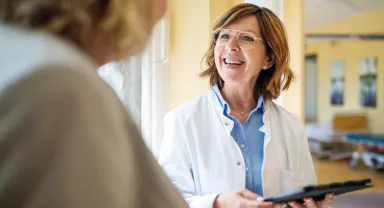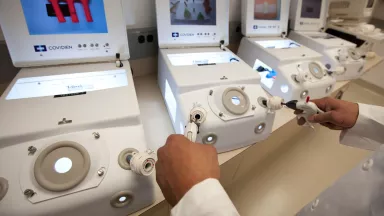Introduction
Our world-renowned orthopedic surgeons and orthopedists are experts in their fields with specialized training to provide the optimal diagnosis and treatment for a range of orthopedic conditions. We are internationally recognized for delivering the highest-quality orthopedic care to our patients.
Hip pain can make it hard for your child to walk, go up and down stairs, squat or sleep on the side that hurts. A clicking or snapping feeling or sound around the hip joint (snapping hip) may be a cause for concern. But if their hip is not painful, in many cases the click or snap is nothing to worry about. Home treatment may be all that is needed for minor hip symptoms.
To better understand your child’s hip problems, it may be helpful to know how the hip works.
What are hip problems in older children?
Hip problems may develop from overuse, bone changes with age, tumors, infection, changes in the blood supply or an issue that was present from birth (congenital). The type of hip pain your child has may help your doctor determine its cause. The typical types of hip pain include:
- Pain when resting, which does not increase with motion or standing. This type of pain is usually caused by a less severe issue, unless the pain does not go away or awakens your child from sleep.
- Pain with movement, which increases when your child moves their hip or leg but does not increase when standing or bearing weight. This type of pain is most often caused by a muscle injury, inflammation or infection.
- Pain with weight-bearing, which increases when your child stands or walks and may cause them to limp. This type of pain usually means they have a problem with the hip joint itself. Pain that is severe enough to prevent any weight-bearing is more likely to mean a serious bone or joint problem.
- Pelvic, groin, thigh or knee pain may be present along with a sore, painful or tender hip.
What causes hip pain in older children?
Hip pain in older children can have different causes:
- Snapping pain on the outside of the hip and sometimes the knee may be caused by iliotibial band syndrome (pain on the outside of one or both of your knees that sometimes spreads up the thigh to the hip, common in long-distance runners).
- Pain in the hip, thigh or knee of an older child or teen may be caused by conditions such as slipped capital femoral epiphysis, in which the upper end of the thigh bone (femur) slips at the growth plate (epiphysis) or by Legg-Calve-Perthes disease (decreased blood flow to the head of the femur, causing bone collapse and inflammation).
- Pain that is worse in the morning and improves during the day may be caused by bones rubbing together, such as with osteoarthritis, rheumatoid arthritis or lupus.
- Pain may be a sign of inflammation of the large sac that separates the hip bones from the muscles and tendons of the thighs and buttocks (trochanteric bursitis).
- Pain can occur with signs of infection in a joint (septic arthritis), bursa (septic bursitis) or bone (osteomyelitis).
- Pain and stiffening in the hip may be caused by lack of blood flow to the hip joint (avascular necrosis). Pain in the knee may also be present.
- Pain that shoots down the leg from the hip or lower back may be caused by an irritated or pinched nerve (sciatica).
- Pain with weight-bearing that gradually worsens over several months may be caused by transient osteoporosis.
- Some types of bone cancer (osteosarcomas) and the spread of cancer to the bone (metastatic disease) can cause bone pain.
How is it treated?
Treatment for a hip problem depends on the location, type and severity of the problem as well as the child’s age, general health and activities. Treatment may include first aid measures; application of a brace, cast, harness or traction; physical therapy; medicine or surgery.
Check with your child’s physician to determine if any of these conditions merits additional treatment.
Physician Referrals
Montefiore Einstein embraces a collaborative approach.
If you have a patient who could benefit from our services, please reach out.
718-920-2060
Schedule a Visit
Have a general question or concern?
We’re available to help you by phone or email.
• 718-920-2060 • orthofeedback@montefiore.org






